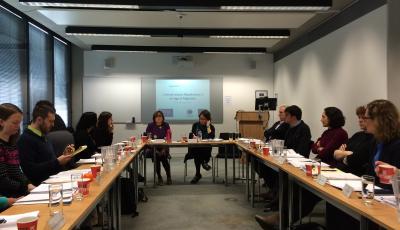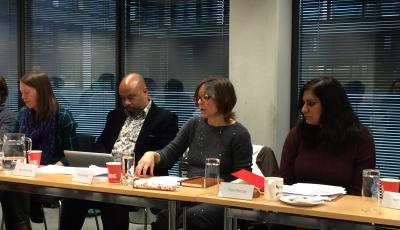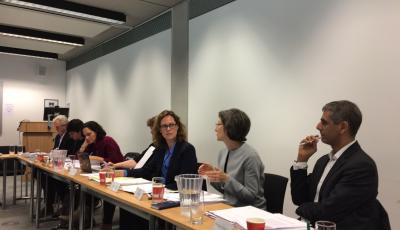Post by Dominic Aitken, DPhil candidate in Criminology at the University of Oxford. In this post, Dominic reports on a two-day workshop that took place on 17-18 March 2016 at the University of Oxford, organised by Ana Aliverti (Warwick Law School) with funding from her British Academy Rising Star Engagement Award.
Criminal justice is about more than simply trials and courtrooms. It’s about who we are and how we live together, bearing the imprint of historical, political, and economic changes. Although criminal justice systems are typically domestic arrangements, the movement of people, goods, services, and capital has required them to adapt to international pressures. Large-scale changes in economic policy and political institutions have put issues such as citizenship, nationalism, and migration on the criminal justice agenda. Although we should be sceptical about new ‘epochs’ supposedly brought in by the vast, impersonal forces of globalization, it’s true that some things have changed in important ways. The effects of migration on law formed the background to the recent British Academy workshop, ‘Criminal Justice Adjudication in an Age of Migration,’ organised by Warwick Law School and hosted by Oxford’s Centre for Criminology.

Analysing a particularly concrete example of the convergence of criminal justice and migration control, Mary Bosworth explained the UK’s Returns and Reintegration Fund, a scheme which has financed a new prison wing, prison training programs, and mandatory prisoner transfer agreements in Nigeria and Jamaica. The globalising reach of what she ironically called ‘penal humanitarianism’ reminds us of the enduring colonial connection, and the political tensions that arise from promoting particular ideas and practices overseas. With the growth of prison privatization in ‘correctional markets’ which know no borders, we ought to watch this space.
Migration is, of course, a measurable social fact, and public discussion is often couched in numerical terms, however unreliable and dehumanizing they might be. Crucially, though, ‘immigrants,’ ‘non-citizens,’ and ‘criminals’ are powerful cultural concepts, shot through with racial and ethnic ideas, gender norms, and other social categories. Many of the terms that have surfaced in recent years are strongly racialized, whether in the form of ‘bogus asylum seekers,’ ‘Islamic terrorists,’ or other stereotypes. Despite the grand language of national security, however, extended police powers are often used simply to perform low-levelling drug policing, as Maartje van der Woude and Jelmer Brouwer argued, based on research done in Schengen’s internal border areas.

In a very different context, Jennifer Chacón gave evidence of the disproportionate prosecution of African-American men in the enforcement of recently enacted state-level human trafficking laws. Though the rationales differ across states, she argued that different legislative histories have had little impact on how laws are used, suggesting that rhetoric is often at odds with reality. In David Sklansky’s discussion of the paper, he pointed out that ‘human trafficking’ as a single, albeit contested, concept only came into being around the year 1998. As a single term that combines slavery, sex work, drug smuggling, and numerous other serious social issues, different groups are competing to monopolise the meaning of this powerful new term. It’s important to remember, however, that anti-trafficking laws have also been used to police and prosecute domestic gang members, disproportionately African-American men, and that a huge number of estimated trafficking victims are African-American women. This combination of legal innovation and predictably partial application has a distinct air of new laws catering to old prejudices.

This workshop brought together a superb group of scholars to discuss, in great detail and with considerable insight, many important issues facing the United States and Western Europe. Though this geographical scope is limited when discussing issues that are by definition international, these papers are well worth reading and thinking about.
Many of the organising themes and practices studied in border criminologies are morally troubling. Immigration detention, deportation, and human trafficking remind us of the stark inequality of the world, and to anyone who has visited sites of immigration enforcement, pessimism is the default response. The distinctive contribution of academics is to ask critical questions of migration control and criminal justice, not only as technical problems of demography and economic growth, but also in the sharper language of racial, economic, gender, and legal inequality. Bringing practices that are naturally out of sight and out of mind into public consciousness is exactly what we need.
The papers for this workshop are being prepared for publication in a forthcoming special issue of the New Criminal Law Review. Border Criminologies will run another post on the occasion of this publication.
Any comments about this post? Get in touch with us! Send us an email, or post a comment here or on Facebook. You can also tweet us.
__________
How to cite this blog post (Harvard style):
Aitken, D. (2016) Criminal Justice Adjudication in an Age of Migration. Available at: https://www.law.ox.ac.uk/research-subject-groups/centre-criminology/centreborder-criminologies/blog/2016/04/criminal-justice (Accessed [date]).
Share:








